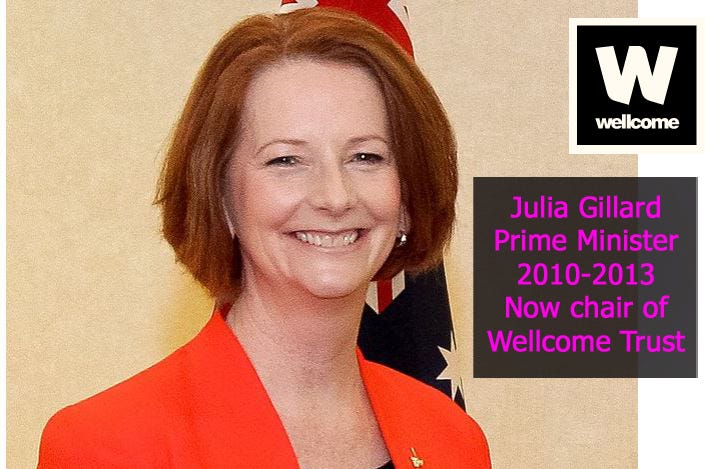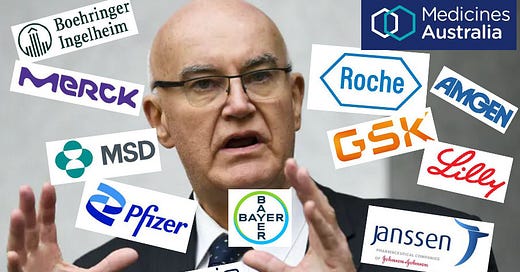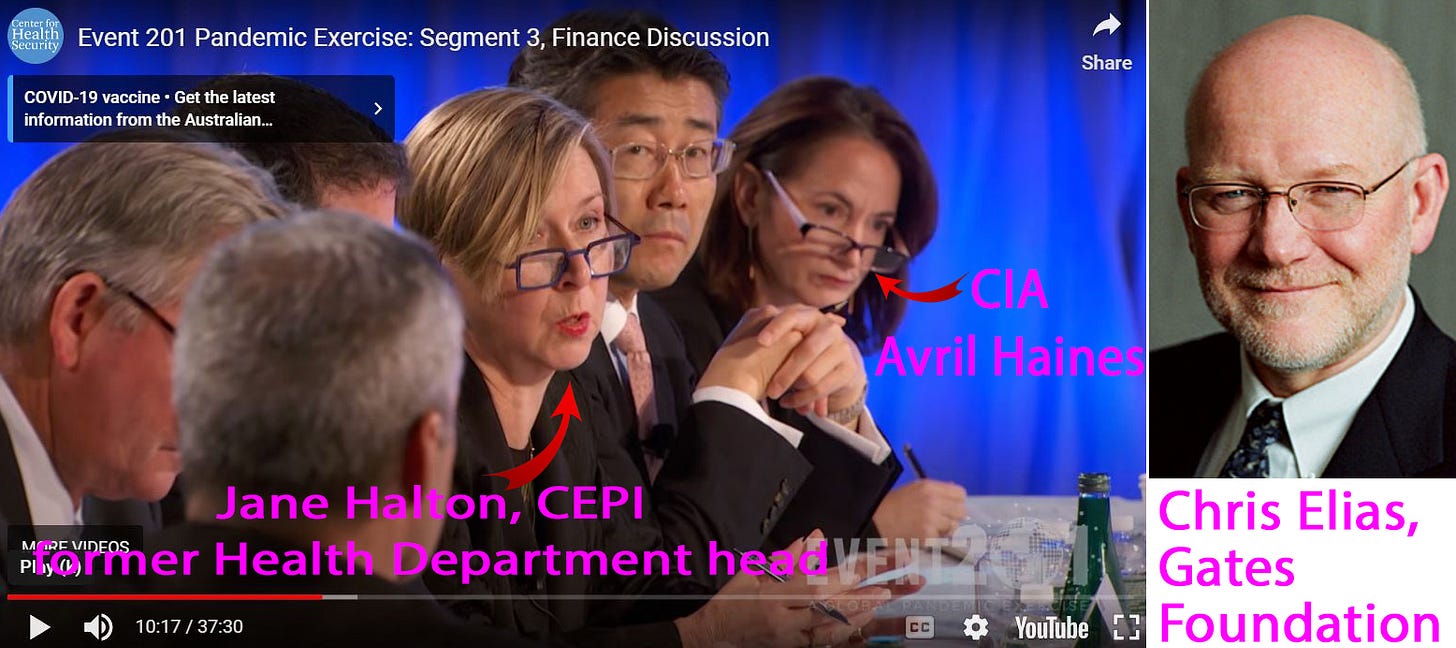Meet some of the biggest fish. You want to know how we got forced to spend $18 billion on covid gene-vaccines and treatments under secret contracts?
Government heavyweights and the drug industry are laced together by their careers. Ambition and undue influence has shut the public out of decision-making.
Former TGA head John Skerritt on Medicines Australia board
Professor John Skerritt, the face of Australia’s vaccine mandates and lockdowns, has been appointed to the board of Big Pharma lobby group Medicines Australia.
Professor Skerritt was Deputy Secretary Health Products Regulation Group at the Department of Health until April 2023 and head of the Therapeutic Goods Administration (TGA). He will bring his top-level internal knowledge of how the TGA and Health Departments work along with his contacts straight to the big pharmaceutical corporations, who profited from the pandemic-era policies.
Other Medicines Australia board members, with whom he will rub shoulders, are high-level executives from Merck Sharp and Dohme, Janssen, GSK, Abbvie, Amgen, Boehringer Ingelheim and Pfizer, as Medicines Australia’s website says.
“John’s deep understanding of government, and policy development and implementation, will be invaluable as Medicines Australia builds on the work undertaken to date with the Government on the reforms needed to speed up patient access to new medicines,” said Medicines Australia chair Anna Lavelle in her December 4 welcome announcement.
One Nation Senator Malcolm Roberts took a different view in a video uploaded to YouTube on February 15.
“It sounds like a massive conflict of interest to me,” he said.
Professor Skerritt is, however, just one of many high-level government officials and former political leaders now promoting the goals of large drug companies.
Professor John Skerritt, 11 years at the TGA, now a director of Medicines Australia
Former Prime Minister Julia Gillard, Wellcome Trust chair
Julia Gillard, prime minister from 2010 to 2013, is now the chair of the Wellcome Trust.
The Wellcome Trust was founded by a bequest from pharmaceutical billionaire Henry Wellcome, whose firm merged with Glaxo. Glaxo-Wellcome merged again in 2000 to form the world’s then-largest drug company GlaxoSmithKline (now GSK).
The Gates Foundation, Wellcome Trust, CEPI, GAVI and the World Health Organisation (WHO) work together as a cartel to promote the partner-profits and interests of drug giants (such as GSK) with whom they are linked.
The Wellcome Trust funds medical research which it then uses to persuade policy makers to adopt their agenda.
Wellcome promotes initiatives that translate into partner-profits for GSK and other cartel members. Wellcome co-founded the gene-vaccine promoter CEPI (Coalition for Epidemic Preparedness Innovations) in 2017 and keeps a close relationship with it.

The new chief executive of Wellcome, John-Arne Røttingen, was the founding chief executive of CEPI, launched at Davos by the WEF in 2017.
Jeremy Farrar, director of Wellcome from 2013 to 2023 (now chief scientist at the WHO), wrote a journal article Establishing a Global Vaccine-Development Fund that is said to have led to the creation of CEPI,
Health Department head Jane Halton, long-term CEPI chair.
CEPI’s mission is to push the mRNA gene-vaccine platform at the highest international levels as a 100-day countermeasure for emerging infectious diseases.
Jane Halton was the founding CEPI chair in 2018, and was re-elected to another five-year term in 2021. She is co-chair of the COVAX facility, co-founded by CEPI. COVAX takes billions in taxes from developed nations (including Australia) to buy gene-vaccines from Big Pharma profit-partners for poor countries. This expands the gene-vaccine market (in the name of charity and “equitable access”).

The Federal Government put Professor Halton in charge of the independent review of Australia’s covid vaccine and treatment procurement in 2022, in a clear conflict of interest with her CEPI role as a promoter of mRNA gene-vaccines.
Even Crikey.com noticed that Jane Halton was all over Australia’s pandemic response as a government advisor.
Her review made eight recommendations that encouraged more gene-vaccine purchasing, including that Australia should encourage booster uptake in 2024 with public health campaigns, make partnerships with industry, buy more Moderna mRNA so children under five have access, and to consider making the pandemic removal of “regulatory burden” permanent.
Jane Halton is a Permanent Canberra kingpin, having spent 33 years at the highest levels of the public service.
Born in the UK, she went from the Department of Prime Minister and Cabinet to head the Department of Health from 2002 until 2014, then the Department of Finance until 2016. She is married to Trevor Sutton, Australian Bureau of Statistics deputy statistitian from 2009 to 2017 when he retired.
Halton is on the ANZ board and was, from 2004-07, on the executive board of the WHO.
She participated in Event 201 alongside CIA deputy director Avril Haines, Gates Foundation global development program president Chris Elias and George Gao, Director of the Chinese Center for Disease Control and Prevention.
Event 201 was a high-level drill held in New York in October 2019, right on the eve of covid, that simulated a pandemic sparked by a novel coronavirus jumping from bats to pigs to people. Surprise!
Event 201 rehearsed the implementation of the Gates/WEF agenda of public-private partnerships, censorship of social media, and vaccines as key public health responses. It practised how to manipulate and control people, not how to care for them. The drill assumed without evidence that vaccines produced at speed, disregarding protocols, would be safe.
Event 201 was funded by the WEF, the Gates Foundation and Johns Hopkins.
Jane Halton has won plenty of ongoing funding for CEPI from Australian taxpayers. In 2022 the Australian Government pledged $100 million for CEPI to fight pandemics as The Mandarin reported.
She is also connected to the security state as a director of the Australian Strategic Policy Institute (ASPI). ASPI is an influential policy think-tank funded by the Department of Defense, Australian and overseas governments.
TGA senior official Mark McDonald now at GSK
GSK Australia’s head of regulatory affairs Mark McDonald worked for Australia’s drug regulator, the Therapeutic Goods Administration (TGA) for 21 years, according to LinkedIn.
Dr McDonald worked in the Prescription Medicines Authorisation Branch of the Health Products Regulation Group in 2019, presenting with former TGA head Professor John Skerritt on medicines scheduling, and writing about the fast-track pathways to drug approvals.
GSK is all for fast-tracked drug approvals, as it made clear in its submission to the TGA on creating a provisional approval pathway. So is Jane Halton who is pushing 100-day gene-vaccines.
Overseas kingpins
Jeremy Farrar - Director of the Wellcome Trust from 2013 to 2023, contributing author at the WEF, appointed chief scientist at the WHO in 2023 to oversee the entire science division. It is Jeremy Farrar who will control what medicines you have to take in the next pandemic if the International Health Regulations pass.
Rishi Sunak - British Prime Minister. Sunak co-founded hedge fund Theleme Partners with Patrick DeGorcy a former French naval officer. Theleme provided the funding for the Moderna start-up. Moderna had patents for mRNA but had never made a single successful product before the covid pandemic, as Whitney Webb reports.
Jonathan Van-Tam - UK deputy chief medical officer and pandemic celebrity. Called “JVT” by the British public. Hired by Moderna in 2023 as a senior medical consultant. Moderna then spied on commentator Russel Brand when he posted a video noting that JVT - the government worker who bought all Moderna’s vaccines - had moved through the revolving door to Moderna.
Tony Blair - former UK Prime Minister - Tony Blair Institute for Global Change is a British Mini-Me of the Gates Foundation. It promotes public-private partnerships and adult vaccines.
Scott Gottlieb - Commissioner of US drug regulator, the Food and Drug Administration (FDA) from 2017 to 2019. Now on the board of Pfizer.
James C. Smith - chief executive of powerful global wire service Thomson Reuters from 2012 to 2020 when he stepped down to become chair of the Thomson Reuters Foundation. He was on the business council of the WEF in 2014 and is now on the board of Pfizer. Reuters played a key role rubbishing scientists who criticised the mRNA vaccines.
Jesse Goodman, former FDA chief scientist and director of biologics evaluation, joined the board of GSK in 2016, where he still is.
The revolving door is so bad that all nine new members of the US Centres for Disease Control and Prevention (CDC) advisory committee on vaccine recommendations have ties to Big Pharma or promoted key vaccines, as Children’s Health Defense reported in March.
How the cartel works: a new TB vaccine
The Wellcome Trust spent £1.7 billion (A$3.3 billion) on its projects in 2023, including £126 million (A$243 million) on developing a new tuberculosis (TB) vaccine, according to it’s annual report.
There is nothing wrong with the reliable 100-year-old BCG vaccine for children. It practically wiped out TB in Britain after it was introduced for mass vaccination in 1953. The National Health Service says case numbers fell from 50,000 per year in 1950 to 5745 in 1987. Very few people in Britain have TB: in 2016, more than 73 percent of cases were migrants from high-prevalence countries, mostly India and Pakistan.
It stands to reason that distributing the cheap, effective BCG to high-prevalence developing countries would be a sensible strategy.
The cost of a dose of BCG was just US$2 to $3 according to a 2006 journal article in the Archives of Disease in Childhood.
“Infant BCG vaccination should therefore continue in countries with a high incidence of tuberculosis,” the authors wrote.
But the BCG is out of patent, generic and cheap. Big Pharma can’t make big profits from it. A new drug that is intellectually copyrighted however, would make super profits for anyone involved in patenting and selling it.
Enter GSK, Wellcome Trust, Gates Foundation and the WHO - ready to spend hundreds of millions of dollars promoting and developing a new patented drug that will reap billions of dollars in global sales.
In 2020, GSK licensed its new tuberculosis vaccine candidate M72/AS01E to the Bill and Melinda Gates Foundation.
That is the exact same vaccine candidate that the Wellcome Trust is promoting.
Gavi, a vaccine-promoting lobby group and public-private partnership funded by the Gates Foundation, is also pumping the need for a new TB product.
Guess which candidate Gavi is interested in? M72/AS01E. Surprise!
The WHO, whose second-largest donor in 2020-21 was the Gates Foundation, is putting out press releases calling for new TB vaccines. Last year it started a TB vaccine accelerator council with Wellcome Trust and Gates Foundation kingpins on its Principal Group leadership team.
Their argument is that the reliable old BCG is only for infants, and they need a new one for adults and adolescents.
“More than 90% of incident TB cases are among adolescent and adult populations: vaccines that can stop transmission among this population groups are urgently needed,” WHO spokesperson Nebiat Gebreselassie told Letters From Australia via email.
“The development of a safe and effective TB vaccine that can dramatically reduce disease incidence would undoubtedly be the best solution to prevent and potentially eradicate TB, and to combat the antimicrobial resistance crisis.”
Undoubtedly, however, it would also justify diverting a lot of government money to a profitable “next generation” vaccine.
Building a fake case
WHO commissioned a report on the investment case for developing new TB vaccines.
The report references only a handful of studies, five of which were written by mostly the same people including Harvard-educated scientist Allison Portnoy who has had close ties with the Bill & Melinda Gates Foundation for years and Rebecca Clark, a research fellow at the London School of Hygiene and Tropical Medicine, which gets funding and PhD scholarships from GSK.
One of the studies, Portnoy et al, The potential impact of novel tuberculosis vaccine introduction on economic growth in low- and middle-income countries: A modeling study was funded by the Gates Foundation and the Wellcome Trust.
A second, Portnoy et al, The cost and cost-effectiveness of novel tuberculosis vaccines in low- and middle-income countries: A modeling study, was funded by the Gates Foundation and the Wellcome Trust.
A third, by Portnoy et al, The potential impact of novel tuberculosis vaccines on health equity and financial protection in low-income and middle-income countries, was funded by the Gates Foundation and the Wellcome Trust.
A fourth, by Clark et al (Portnoy was a co-author along with Ms Gebreselassie from WHO), The impact of alternative delivery strategies for novel tuberculosis vaccines in low-income and middle-income countries: a modelling study, had several authors listed as being funded by the Gates Foundation, Gavi, and the Wellcome Trust.
A fifth study, Tait et al, Final Analysis of a Trial of M72/AS01E Vaccine to Prevent Tuberculosis evaluated the GSK vaccine candidate M72/AS01E. It was funded by the Gates Foundation and GSK. Most of the authors listed were either direct employees of GlaxoSmithKline (GSK) or received grant funding from GSK as revealed by their disclosure statement.
So the WHO built its investment case for ditching the BCG in favour of an expensive new patented product on the basis of research paid for by organisations connected to that product.
The GSK candidate M72/AS01E was in Phase III clinical trials as of June 2023, funded by the Gates Foundation and Wellcome Trust, as the Trust said on its website.
The cost of the Phase III trials alone is US$550 million, with Wellcome paying up to US$150 million and the Gates Foundation paying the remainder, about US$400 million.
The Phase III trial cost alone would pay for more than 180 million doses of BCG in the developing world at US$3 each, which might go a long way towards eradicating TB the same way Britain did.
The WHO, Wellcome Trust and Gates Foundation are, however, spreading publicity about the need for a new product.
The WHO updated its vaccine guidance in 2023 to say a new tuberculosis vaccine to prevent disease in adolescents and adults is “urgently needed” with the potential for “multiple vaccines” to be authorised within three years.
In June 2023, Julia Gillard, Bill Gates and WHO Director-General Tedros Adhanom Ghebreyesus gave helpful quotes for a Wellcome press release promoting GSK candidate M72/AS01E, with Tedros saying: “The tuberculosis crisis demands a new vaccine to reduce disease transmission and avoidable death”.
See? It’s a “crisis”.
Once an “urgent need” can be established for the new vaccine, it will not be “free” for the developing nations. Your taxes will pay for them, to the tune of billions, through the Covax facility organised by Gavi, CEPI and the WHO, because Australia has joined Covax, too.
And that’s how it’s done.
If you liked this piece, please share it everywhere, it helps. And subscribe, it’s free. You won’t get spammed, it just sends an email once a new story is out (about every 2 weeks for me). Reporters - you are free to reproduce material, only please hat-tip with a link credit :)








If anybody is looking for a big and detailed list of the many public conflicts of interest, the IMOP have compiled a comprehensive list with references. It's excellent, thorough, detailed and long. It's here: https://heartparty.com.au/Conflicts-of-Interest-in-Vaccination-Policies
Great summary of conflict of interest information Alison, very useful to have this collection of information, much to build upon.
In regard to the “100-year-old BCG vaccine for children”, I’ll reserve judgement on this one, it’s not on the schedule here.
After 15 years investigating vaccination policy and practice, I’m questioning all the vaccine products and revaccinations. Transparency and accountability for these medical interventions has been denied for years, including the bias of the conflicted journal industry.